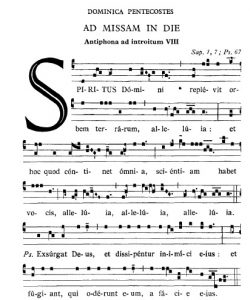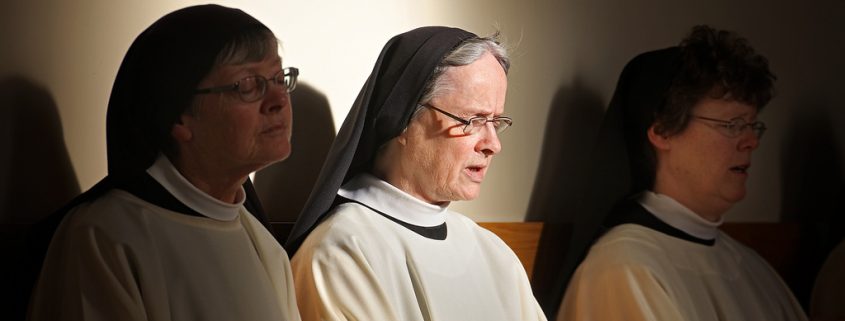Reflection for Pentecost Sunday
The Spirit of the Lord has filled the whole world and that which contains all things understands what is said, alleluia (Wis 1:7, sung with verses from psalm 67).
The opening of the book of Wisdom, from which this text is taken, is a reflection on what it is to seek God and to reject evil. The incorporation of these words into the liturgy of Pentecost indicates that we can see them as a prophecy which is fulfilled today.
The Spirit of the Lord has filled the whole world – this has always been true. The Word of God and the Breath of God are at the origin of the being and life of every creature. People who believe in God but who do not share Christian faith, can accept that there is a divine Spirit, some animating element, as it were, of God, within the universe and within everything that is alive.
If something new happens at Pentecost – what is that new thing? The Spirit comes upon each one of us personally; but did not the people who lived before Pentecost also experience the Spirit individually? Were not the many holy people who were in relationship with God in Old Testament times not filled with the Holy Spirit? When we talk about a new presence of the Holy Spirit because of Pentecost, what do we mean? What do we have that Abraham or Moses or Hannah did not have? The answer is: knowledge of Jesus, relationship with Jesus, access to the Father through Jesus.
If Pentecost had not happened, only those who knew him in his earthly life would have such knowledge. Without the Pentecostal presence of the Holy Spirit, the Spirit of Jesus, our knowledge would remain at the level of intellectual knowledge, facts. The Holy Spirit makes Jesus alive and real for us, makes the words of the Gospel fresh and powerful for us. This is the new thing that has happened, the new way in which the Spirit of the Lord has filled the whole world.
The second part of the prophetic text of the antiphon says that the Spirit, who holds all things in being, knows every word that is said. The Latin is literally “has knowledge of the voice” (scientiam habet vocis). We are used to the idea that God knows everything, including what we say. But the fulfilment of the prophecy at Pentecost takes this to a new level. The Holy Spirit not only knows the words that we say, but gives us the words to say for the proclamation of the Gospel. Human words alone could never be sufficient to carry the message of the Gospel. When Christians preach Jesus, it is not a matter of teaching about him like any other historical character; it is about communicating a living person, the living Son of the living God. No human words or communication skills alone have that capacity. Unless the Spirit of God speaks through us and gives us what to say, our words are lifeless and useless.
The opening verse of the psalm which accompanies this antiphon is the beginning of psalm 67: Let God arise, let his foes be scattered, let those that hate him flee before him. At Pentecost, in the context of the fulfilment of the prophecy about the Holy Spirit, the Church speaks of overcoming God’s foes. The overcoming of God’s enemies, the powers of darkness and destruction and death, can happen only through the Holy Spirit, not by any human power.
Another way in which the words the Spirit knows all that is said are brought to fulfilment is that the Holy Spirit now not only knows our words, our voice, but even becomes our voice, especially the voice of our prayer. In his book Teach Us To Pray*, Dom André Louf speaks about prayer as a gift that is already given to us, that is already within us, not as something we have to do. Because the Holy Spirit has been poured into our hearts at baptism, and lives within us, crying out, Abba Father, prayer is constantly happening in our hearts. Our task at prayer, Louf explains, is to quieten down, get in touch with that prayer that is already going on within us, and enter into it, being absorbed into that movement of the Spirit and transformed by it. This concept removes the notion that prayer is a task that we have to accomplish; and offers a more accessible understanding of prayer.
The Spirit knows every word that is said, because the Spirit is in fact doing the saying.
May the Holy Spirit really fill us anew today, as individuals and as community; as local church and as universal church. Amen.
Here is the Latin chant version of this antiphon:

You can listen to it here: https://www.youtube.com/watch?v=RoApQ6YKzaE
(the Graduale Project)
* Darton, Longman Todd, 1974; second revised edition, 1991
– Sr Eleanor Campion



